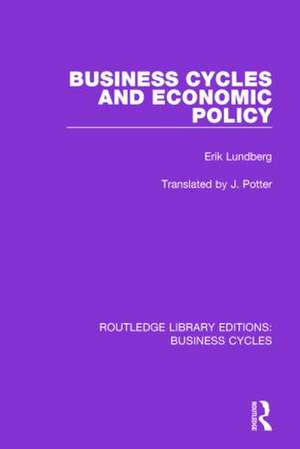Business Cycles and Economic Policy (RLE: Business Cycles): Routledge Library Editions: Business Cycles
Autor Erik Lundberg Traducere de J Potteren Limba Engleză Paperback – 30 oct 2016
| Toate formatele și edițiile | Preț | Express |
|---|---|---|
| Paperback (1) | 273.88 lei 6-8 săpt. | |
| Taylor & Francis – 30 oct 2016 | 273.88 lei 6-8 săpt. | |
| Hardback (1) | 1061.06 lei 6-8 săpt. | |
| Taylor & Francis – 23 mar 2015 | 1061.06 lei 6-8 săpt. |
Preț: 273.88 lei
Preț vechi: 342.29 lei
-20% Nou
Puncte Express: 411
Preț estimativ în valută:
52.42€ • 56.96$ • 44.06£
52.42€ • 56.96$ • 44.06£
Carte tipărită la comandă
Livrare economică 21 aprilie-05 mai
Preluare comenzi: 021 569.72.76
Specificații
ISBN-13: 9781138888289
ISBN-10: 1138888281
Pagini: 370
Dimensiuni: 156 x 234 mm
Greutate: 0.52 kg
Ediția:1
Editura: Taylor & Francis
Colecția Routledge
Seria Routledge Library Editions: Business Cycles
Locul publicării:Oxford, United Kingdom
ISBN-10: 1138888281
Pagini: 370
Dimensiuni: 156 x 234 mm
Greutate: 0.52 kg
Ediția:1
Editura: Taylor & Francis
Colecția Routledge
Seria Routledge Library Editions: Business Cycles
Locul publicării:Oxford, United Kingdom
Public țintă
General, Postgraduate, Professional, and UndergraduateCuprins
Part I: The Swedish Economy between the Two World Wars 1. Introduction 2. Income and Production Trends 3. Comparison of Swedish Economic Development in the 1920s and 1930s Part II: The Cyclical Sensitivity of the Swedish Economy; the Experiences of the Interwar Period 4. Introduction 5. Fluctuations in Swedish Foreign Trade 6. Effects on Income Formation of Changes in Foreign Trade 7. Business Cycles and the Balance of Payments 8. Fluctuations in Investment Activity 9. Fluctuations in Incomes and Consumption Part III: Problems of Economic Instability in Sweden since 1945 10. Economic Problems of the Early Post-War Years 11. Economic Changes under Conditions of Inflation, 1945-51 12. A Theoretical Analysis of the High Inflationary Potential of the Swedish Economy 13. The Change in economic conditions, 1951-54 14. SUMMARY Part IV: The Ends and Means of Economic Policy Part V: The Economic Policy Debate of the Inter-War Period 15. The Policy of Deflation in the Early 1920s 16. The Equilibrating Mechanism of the Gold Standard 17. The Policy of Stabilization in the 1930s 18. Research into Problems of Economic Policy during the 1930s 19. Different Views of the Potentialities of Fiscal Policy 20. General Comments on the Outcome of the Policy Discussions of the 1930s Part VI: The Ends and Means of Swedish Monetary Policy since 1945 21. The Formulation of Aims 22. Motives and Arguments for Low Interest Rates 23. The Policy of the Riksbank during the Years of Inflation, 1945-48 24. Control of the Supply of Money Part VII: Old and New Aspects of Monetary Policy Part VIII: Inflationary Gap Analysis and the Preparation of National Budgets 25. Introduction 26. Statistical Evidence of General Economic Equilibrium 27. Simplifying Assumptions and Methods 28. Causes of Errors in Forecasting 29. Conclusions Part IX: The Possibilities of Fiscal Policy 30. The Possibilities of Discrimination in Fiscal Policy Part X: Wages under Full Employment 31. Causes of Wage Inflation 32. Problems of a Wage Stabilization Policy 33. Conclusions Part XI: The Post-War Policy of Regulation General Comments on Controls 34. General Comments on Controls 35. The Functioning of Import Regulation 36. The Regulation of Building Activity as a Means of Economic Policy 37. The Functioning of Price Control Part XII: Economic Policy and the Functioning of the Price System 38. General Survey 39. Comparisons between General and Discriminative Measures of Economic Policy 40. Imperfections in the Price System
Notă biografică
Multivolume collection by leading authors in the field
Descriere
This book provides information on a statistical account and theoretical interpretation of Swedish business cycles since 1918 as well as a survey of the problems of economic policy, as revealed both in practice and in theoretical discussion, during the inter-war and post-war periods.




















